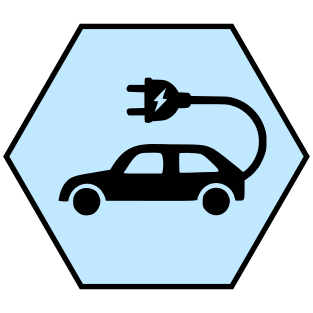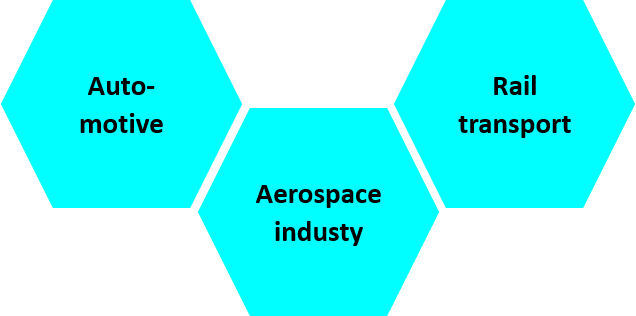The aim of the Environmentally Friendly Transport domain is to use key technologies and applications in transport to reduce the negative environmental impacts of transport.
The domain is included under the thematic area Transport for the 21st Century.

Why is Environmentally friendly transport included among the RIS3 priorities?
- There have been increasing demands for energy and environmentally sustainable transport while maintaining accessibility.
- Thanks to political and public pressure to tackle climate change and the general attitude of society, we can expect an increase in interest in modern, environmentally friendly and energy efficient transport and related equipment in the future.
- Research and innovation will be supported to maximise the reduction of emissions in transport, reduce fossil fuel consumption, develop new materials with higher durability, and clean-engine technologies, including e-mobility technologies.
- An integral part of the domain is the environmental-friendliness of production in the sense of using a raw material base based on recycled materials or materials from renewable sources
- Research into the efficient use of raw materials for transport vehicles and transport infrastructure at the end of their useful life is also promising.
- A need has emerged to develop infrastructure and transport systems for electromobility in a broader sense (using hydrogen or synthetic methane based on electrolysis)
- The development of infrastructure for advanced transport – Smart Grids, and power management vehicles for driving electric and hybrid buses is also expected.
- Environmentally Friendly (Green) transport will have significant economic and social implications, so there is a need to develop a system of effective education on the transformation of key technologies, including transport.
Application sectors in the thematic area
The Transport for the 21st Century thematic area includes three application sectors:
- Automotive deals with the development, manufacture, marketing, sale, maintenance and disposal of on-road and off-road motor vehicles and their accessories. For the purposes of the RIS3 strategy, this sector includes on-road and off-road passenger and freight vehicles, buses, electric buses and trolleybuses.
- The aerospace industry focuses on research and innovation of aircraft components such as aircraft engines (turbines), leading edges, compressors, wheels, brakes, etc., as well as aircraft structure (design) and construction. Another important area of R&D is the technologies and materials used in aircraft manufacturing (e.g. precision casting, composite materials, surfaces and their processing, etc.).
- Rail Transport is involved in research and innovation of locomotives and rail vehicles (including trams) and their components (seats, engines, axles, chassis, doors, etc.)
Strategic theme of research and innovation in application sectors
Low-emission mobility
The strategic theme of low-emission mobility covers all research and innovation topics identified in documents such as the Transport Policy of the Czech Republic for 2021-2027 with a View to 2050, the National Action Plan for Clean Mobility, and are also included in EU transport strategies emphasising zero-emission mobility and its development and support for related research, development and innovation. The transport sector is part of a wider effort to transform economies and societies to achieve more solution with reduced pollution that are more climate-friendly. In order to find the optimal combination of solutions, a technology-neutral approach must be taken, i.e. the goal is not to prescribe technical solutions, but their desirable parameters, from a product life-cycle perspective.

Key enabling technologies in the Environmentally friendly transport domain
In this domain, the following key enabling technologies are particularly applicable:
- Advanced materials and nanotechnologies and their applications in vehicles, transport, transport infrastructure and space systems
- Biotechnology contributing to the reduction of the negative environmental impact of transport environmental burdens, biofuels
- Advanced manufacturing technologies for the production of vehicles, transport and space systems
The specific research and innovation themes for key enabling technologies in this domain can be found in Annex 1 to the National RIS3.
More detailed general information on key enabling technologies can be found here.
Themes concerning social sciences, humanities and arts included under the Environmentally Friendly Transport domain
The following SSHA themes will be explored and developed in this domain:
- Addressing 21st century societal challenges associated with emerging technologies
- Conditions/barriers to the application of innovative technologies and practices
- Security Research
Promoting a proactive approach to addressing 21st century societal challenges and challenges associated with emerging technologies
- Choosing a mode of transport towards sustainable mobility and transport and in the context of organisational outcomes
- Promoting the use of public transport to ensure mobility
- Strengthening acceptance and purchasing behaviour in terms of higher penetration of electric vehicles in the Czech environment
- Collaborative economy in transport and environmental impacts
- Socio-economic aspects of the development of environmentally friendly (sustainable) transport, including the transformation of settlements
Security research
-
Security research on electromobility from the perspective of fire prevention and emergency procedures in an electric or hybrid vehicle
More detailed general information on the themes of social sciences, humanities and arts can be found here.
National Innovation Platform Transport for the 21st Century
National Innovation Platforms are working groups where the entrepreneurial discovery process (EDP) is put into practice.
The Environmentally friendly Transport domain is discussed in the National Innovation Platform III - Transport for the 21st Century, where representatives of the business, research and public spheres meet; this is the well-known Triple Helix model.
Contacts:
![]() Professional guarantor of National Innovation Platform III - Transport for the 21st Century: Zdeněk Lokaj, Faculty of Transport Czech Technical University in Prague, lokaj@fd.cvut.cz
Professional guarantor of National Innovation Platform III - Transport for the 21st Century: Zdeněk Lokaj, Faculty of Transport Czech Technical University in Prague, lokaj@fd.cvut.cz
![]() Professional guarantor of the National Innovation Platform III - Transport for the 21st Century: Ondřej Mirovský, Technology centre CAS, mirovsky@tc.cz
Professional guarantor of the National Innovation Platform III - Transport for the 21st Century: Ondřej Mirovský, Technology centre CAS, mirovsky@tc.cz
![]() Secretary of National Innovation Platform III - Transport for the 21st Century: Jan Bilík, MIT CR, bilik@mpo.cz
Secretary of National Innovation Platform III - Transport for the 21st Century: Jan Bilík, MIT CR, bilik@mpo.cz

